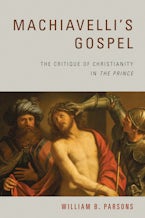
The Empire of Habit
John Locke, Discipline, and the Origins of Liberalism
- Description
- Contents
- Reviews
The Empire of Habit critiques the traditional interpretation of Locke's political thought, revealing that the foundation of Lockean liberalism is not natural law but discipline and habit.
John Locke's political thought provides much of the theoretical underpinning for our own liberal democracy. According to Locke's liberalism, the rights and freedoms of civil society are grounded in natural law, which is known andobserved by all citizens.
In this volume, John Baltes challenges this interpretation of Locke. Examining Locke's Essay Concerning Human Understanding and Some Thoughts Concerning Education, Baltes reveals aLocke who is in conflict with the natural-law philosopher found in his famous Two Treatises of Government. In his works on epistemology and education, Locke describes morality as a construct and human nature as malleable. Drawing on Foucault's concept of discipline, Baltes reconsiders Locke's liberalism and shows that it requires citizens governed not by natural law but habit, that is, subjects who are constructed by carefully controlled space and visibility and regulated in their conduct to become capable of self-government. The Empire of Habit thus offers not only a new reading of one of the most important political philosophers of the Western tradition but also newinsight into our own political liberalism.
John Baltes is an independent scholar of political theory.
John Locke's political thought provides much of the theoretical underpinning for our own liberal democracy. According to Locke's liberalism, the rights and freedoms of civil society are grounded in natural law, which is known andobserved by all citizens.
In this volume, John Baltes challenges this interpretation of Locke. Examining Locke's Essay Concerning Human Understanding and Some Thoughts Concerning Education, Baltes reveals aLocke who is in conflict with the natural-law philosopher found in his famous Two Treatises of Government. In his works on epistemology and education, Locke describes morality as a construct and human nature as malleable. Drawing on Foucault's concept of discipline, Baltes reconsiders Locke's liberalism and shows that it requires citizens governed not by natural law but habit, that is, subjects who are constructed by carefully controlled space and visibility and regulated in their conduct to become capable of self-government. The Empire of Habit thus offers not only a new reading of one of the most important political philosophers of the Western tradition but also newinsight into our own political liberalism.
John Baltes is an independent scholar of political theory.
Acknowledgments
Abbreviations
Introduction
Locke on Religious Crisis and Civil War: Nominalism, Skepticism, and the Essay in Context
Locke's Inverted Quarantine: Discipline, Panopticism, and the Making of the Liberal Subject
Locke's Labor Loosed: Discipline and the Idle
Locke the Landgrave: Inegalitarian Discipline
Notes
Bibliography
Index
Abbreviations
Introduction
Locke on Religious Crisis and Civil War: Nominalism, Skepticism, and the Essay in Context
Locke's Inverted Quarantine: Discipline, Panopticism, and the Making of the Liberal Subject
Locke's Labor Loosed: Discipline and the Idle
Locke the Landgrave: Inegalitarian Discipline
Notes
Bibliography
Index
"[Baltes's volume] counters the common view we have of Locke as a democratic contractarian egalitarian. Second, with some precise examples, it showcases how modern discipline is still moulding us today for liberal government, unbeknownst to us, through early-age habituation and life-long submission to the law of fashion. This second point makes Baltes's book relevant for philosophical reflections today." PHILOSOPHICAL INQUIRIES
"For a short book, this volume covers quite a bit of ground ... John Baltes provides a valuable service to readers, introducing them to an especially thorny problem in Locke's philosophical and political thought. The puzzle at the center of this book, that resisting the tyranny of habitual thinking involves forming habits of resistance, is worth investigating." NOTRE DAME PHILOSOPHICAL REVIEWS
"The Empire of Habit is the most detailed and comprehensive investigation of the fundamental roles of discipline and habit formation in Locke's political, economic, educational, and epistemological writings. It throws new light on the preconditions of Locke's political theory in the Two Treatises. --" James Tully, University of Victoria
Hardcover
9781580465618
June 2016
£80.00 / $95.00
Ebook (EPDF)
9781782047049
June 2016
$29.95 / £24.99



